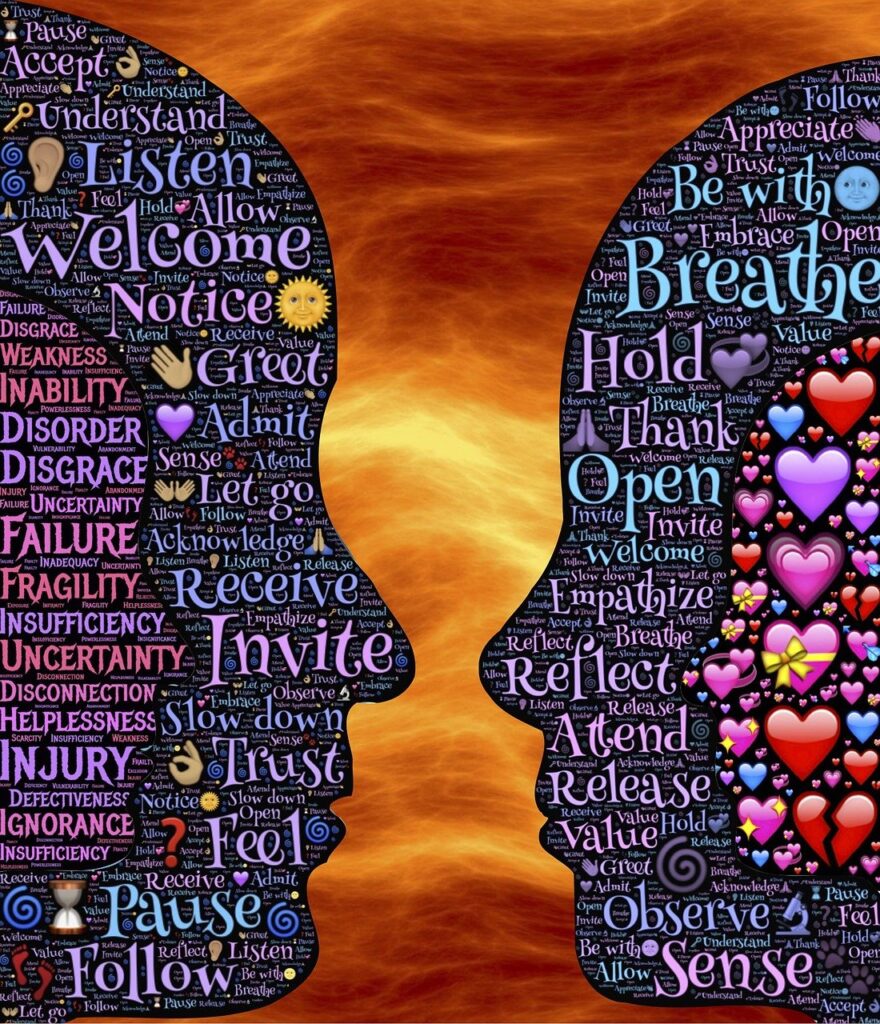
We all have an innate desire to connect with others, to be understood and to understand. Empathy is the key to unlocking this hidden language of human connection. It is the ability to put ourselves in someone else’s shoes, to feel what they feel, and to understand their perspective. When we practice empathy, we can build stronger relationships, resolve conflicts, and create a more compassionate and understanding world.
The Essence of Empathy
Empathy is not just a feel-good concept, it is a powerful tool that can transform the way we interact with others. It is the foundation of emotional intelligence, which is essential for success in all areas of life. By understanding the essence of empathy, we can learn to cultivate it in ourselves and others. In this article, we will explore the science behind empathy, the challenges and critiques of empathy, and how empathy can be applied in different contexts such as leadership, education, and healthcare.
Key Takeaways
- Empathy is the key to unlocking the hidden language of human connection.
- Empathy is the foundation of emotional intelligence, which is essential for success in all areas of life.
- By understanding the essence of empathy, we can learn to cultivate it in ourselves and others.
Related Posts:
The Essence of Empathy
Empathy is the ability to understand and share the feelings of others. It is a powerful tool that allows us to connect with others on a deeper level. When we practice empathy, we are able to put ourselves in someone else’s shoes and see the world from their perspective. This helps us to build stronger relationships, improve communication, and create a more compassionate and understanding world.
At its core, empathy is about connection. It is the ability to recognize and respond to the emotions of others, even when we do not share those emotions ourselves. This requires us to be present and attentive, to listen actively and without judgment, and to be willing to put our own needs and desires aside in order to support others.
Empathy is not just a passive emotion, however. It is also an active skill that can be developed and honed over time. This requires us to be intentional and deliberate in our interactions with others, to practice empathy on a daily basis, and to be open to feedback and growth.
There are many different ways to cultivate empathy, from listening more deeply to others to practicing mindfulness and self-reflection. By making empathy a priority in our lives, we can unlock the hidden language of human connection and create a more compassionate, understanding, and supportive world for all.
Empathy and Human Connection
Empathy is a powerful tool that allows us to connect with others on a deeper level. It is the ability to understand and share the feelings of another person. When we empathize with others, we are better able to communicate, build trust, and form meaningful relationships.
The Role of Empathy in Relationships
Empathy is essential in building strong, healthy relationships. When we are able to put ourselves in another person’s shoes, we can better understand their perspective and respond in a way that is compassionate and supportive. This helps to create a sense of mutual respect and trust, which is crucial in any relationship.
In romantic relationships, empathy can help partners to better understand each other’s needs and feelings. This can lead to more effective communication, increased intimacy, and a stronger emotional connection.
Empathy in Social Settings
Empathy is also important in social settings, such as the workplace or community events. When we are able to empathize with our colleagues or fellow community members, we can better understand their needs and perspectives. This can lead to more effective collaboration, improved teamwork, and a stronger sense of community.
In addition, empathy can help us to navigate difficult social situations, such as conflicts or misunderstandings. When we are able to empathize with others, we can approach these situations with compassion and understanding, rather than defensiveness or aggression.
Overall, empathy is a crucial component of human connection. By cultivating empathy, we can build stronger relationships, improve our communication skills, and create a more compassionate and supportive community.
The Science Behind Empathy
Empathy is a complex psychological phenomenon that has been studied extensively by experts in neuroscience and psychology. It plays a critical role in human connection, enabling individuals to share experiences, needs, and desires with one another, promoting prosocial behavior, and fostering emotional bonds. In this section, we will explore the science behind empathy and how it works.
Neuroscience of Empathy
Neuroscience has shown that empathy is not just a feeling but a complex cognitive process that involves multiple regions of the brain. When we experience empathy, our brain activates a network of neurons called the mirror neuron system, which allows us to understand and share the emotional experiences of others. This system is responsible for our ability to imitate the actions and emotions of others, and it is essential for social learning and communication.
Research has also shown that the hormone oxytocin plays a critical role in empathy. Oxytocin is often referred to as the “love hormone” because it is released during social bonding, sexual activity, and childbirth. Studies have found that when oxytocin levels are increased in the brain, individuals become more empathetic and compassionate towards others.
Psychology of Empathy
Psychology has long recognized empathy as a crucial component of human connection and social interaction. Empathy has been defined as the ability to understand and share the feelings of others, and it is essential for building relationships, resolving conflicts, and promoting cooperation.
One of the most significant benefits of empathy is its ability to reduce prejudice and promote understanding between different groups of people. When we are empathetic towards others, we are more likely to see things from their perspective and less likely to judge them based on stereotypes or preconceptions.
Empathy can also have a positive impact on mental health. Studies have found that individuals who are more empathetic tend to have higher levels of life satisfaction, lower levels of stress, and better overall mental health.
In conclusion, the science behind empathy is complex and multifaceted, involving both neuroscience and psychology. Empathy plays a critical role in human connection and social interaction, enabling individuals to understand and share the emotional experiences of others. By promoting understanding and compassion, empathy has the power to transform our relationships and our world.
Cultivating Empathy
Empathy is a powerful tool for connecting with others and building stronger relationships. It allows us to understand and share the feelings of others, which can lead to greater cooperation, kindness, and trust. However, empathy is not always easy to cultivate. Here are some tips for developing empathy:
Empathy Training
One way to cultivate empathy is through empathy training. This can involve practicing active listening, role-playing, and engaging in other exercises that help us better understand the perspectives of others. By learning to listen attentively and put ourselves in others’ shoes, we can develop a deeper sense of empathy and connection.
Mindfulness and Empathy
Another way to cultivate empathy is through mindfulness. Mindfulness involves being present in the moment and non-judgmentally observing our thoughts and feelings. By practicing mindfulness, we can become more aware of our own emotions and better able to regulate them. This can lead to greater empathy, as we become more attuned to the emotions of others.
Overall, cultivating empathy takes time and effort, but it can be a powerful tool for building stronger relationships and connecting with others on a deeper level.
Related Posts:
Empathy in Leadership
As we strive to become better leaders, one of the most important skills we can develop is empathy. Empathy is the ability to understand and share the feelings of others. It is a critical component of effective leadership, as it allows us to connect with our team members on a deeper level and build strong relationships based on trust and understanding.
Empathic Leadership Styles
There are several different leadership styles that incorporate empathy. One of the most effective is servant leadership, which is focused on serving the needs of others rather than the leader’s own interests. This style of leadership emphasizes empathy, compassion, and humility, and is often associated with increased job satisfaction and engagement among team members.
Another empathic leadership style is transformational leadership, which is focused on inspiring and motivating team members to achieve their full potential. This style of leadership involves creating a vision for the future and communicating it in a way that inspires others to work towards that vision. Transformational leaders are often highly empathetic, and are skilled at understanding the needs and motivations of their team members.
Impact of Empathy on Team Dynamics
Empathy can have a profound impact on team dynamics. When leaders are empathetic, they are better able to understand the needs and concerns of their team members, and can work to create an environment that is supportive and inclusive. This can lead to increased trust and collaboration among team members, and can help to build a strong sense of community within the team.
Empathy can also help to improve communication and conflict resolution within the team. When team members feel that their leader understands and cares about their concerns, they are more likely to be open and honest in their communication. This can help to prevent misunderstandings and conflicts from escalating, and can lead to more effective problem-solving and decision-making.
In summary, empathy is a critical skill for effective leadership. By incorporating empathic leadership styles and fostering a culture of empathy within the team, leaders can build strong relationships with their team members and create a supportive and inclusive environment that fosters trust, collaboration, and innovation.
Empathy in Education
Empathy is a crucial component of human connection, and it has a significant role to play in education. Educators who cultivate empathy in their students can help them develop better communication skills, build stronger relationships, and become more effective problem-solvers. In this section, we will explore the importance of empathy in education and how it can be taught and applied in the classroom.
Teaching Empathy
Teaching empathy involves helping students understand and appreciate the perspectives of others. It is a process of developing emotional intelligence, which is the ability to recognize and manage one’s own emotions and those of others. One way to teach empathy is to encourage students to put themselves in another person’s shoes and imagine how that person might be feeling. This can be done through role-playing exercises, storytelling, and other interactive activities that allow students to practice empathy in a safe and supportive environment.
Another way to teach empathy is through literature. Reading books that explore different cultures, experiences, and perspectives can help students develop a deeper understanding of the world around them and the people in it. By reading stories about characters who are different from themselves, students can learn to appreciate diversity and develop empathy for others.
Empathy in Classroom Dynamics
Empathy can also play a crucial role in classroom dynamics. When educators model empathy in their interactions with students, they create a safe and supportive learning environment where students feel valued and respected. This can lead to better communication, stronger relationships, and a more positive classroom culture.
One way to cultivate empathy in the classroom is to encourage students to listen actively to one another. This means paying attention to what others are saying, asking questions to clarify their understanding, and responding in a way that shows they care. By modeling active listening and encouraging students to practice it themselves, educators can create a classroom culture that values empathy and communication.
Another way to cultivate empathy in the classroom is to encourage students to work together on projects and assignments. This can help them develop teamwork skills and learn to appreciate the contributions of others. By working collaboratively, students can learn to value diversity and develop empathy for their peers.
Overall, empathy is a powerful tool that can help students develop better communication skills, build stronger relationships, and become more effective problem-solvers. By teaching empathy and cultivating it in the classroom, educators can create a safe and supportive learning environment where students can thrive.
Empathy in Healthcare
In the healthcare industry, empathy is a crucial component of patient-centered care. It is the ability to understand and share the feelings of others, especially patients who are going through a tough time. When healthcare providers show empathy towards their patients, it can lead to better communication, increased trust, and improved health outcomes.
Patient-Centered Care
Patient-centered care is a healthcare approach that focuses on the patient’s needs, preferences, and values. It involves treating the patient as a whole person, not just a set of symptoms or a diagnosis. Empathy is a key element of patient-centered care, as it allows healthcare providers to understand the patient’s perspective and tailor their care accordingly.
When healthcare providers show empathy towards their patients, it can lead to several benefits. Patients are more likely to trust their healthcare providers, which can lead to better treatment adherence and improved health outcomes. Additionally, patients who feel heard and understood are more likely to be satisfied with their care, which can lead to increased patient loyalty and positive word-of-mouth referrals.
Empathy in Mental Health Care
Empathy is especially important in mental health care, where patients are often dealing with complex and difficult emotions. When healthcare providers show empathy towards their mental health patients, it can help to reduce stigma and increase understanding of mental health issues.
Additionally, empathy can help to build rapport and trust between mental health patients and their providers. This can lead to increased treatment adherence and improved mental health outcomes. When patients feel heard and understood, they are more likely to open up about their struggles and work collaboratively with their healthcare providers to find effective solutions.
In conclusion, empathy is a critical component of patient-centered care, particularly in mental health care. When healthcare providers show empathy towards their patients, it can lead to better communication, increased trust, and improved health outcomes. By prioritizing empathy in our healthcare systems, we can unlock the hidden language of human connection and improve the lives of patients and providers alike.
Challenges and Critiques of Empathy

Empathy is a powerful tool for building connections and understanding others. However, it is not without its challenges and critiques. In this section, we will explore some of the common challenges and critiques of empathy.
Empathy Fatigue
Empathy can be emotionally taxing, especially when we are exposed to a lot of suffering or traumatic events. This can lead to empathy fatigue, which is a state of emotional exhaustion and burnout. When we experience empathy fatigue, we may find it difficult to connect with others, feel overwhelmed, or become numb to the suffering of others.
To prevent empathy fatigue, it is important to practice self-care and set healthy boundaries. This may involve taking breaks from empathetic listening, seeking support from others, or engaging in activities that promote relaxation and self-care.
Empathy Bias
Empathy can also be biased, meaning that we may be more likely to empathize with people who are similar to us or who we perceive as being part of our in-group. This can lead to a lack of empathy for people who are different from us, which can perpetuate social inequalities and injustice.
To overcome empathy bias, it is important to be aware of our biases and actively work to challenge them. This may involve seeking out diverse perspectives, exposing ourselves to different experiences, and practicing perspective-taking exercises.
Overall, while empathy can be a powerful tool for building connections and understanding others, it is important to be aware of the challenges and critiques associated with it. By practicing self-care and challenging our biases, we can become more effective empathetic listeners and build stronger connections with others.
Empathy in a Digital Age
As we continue to rely more and more on technology to communicate, we must also consider how it affects our ability to empathize with others. In a world where so much of our communication happens online, we must learn how to express and receive empathy through digital means.
Virtual Empathy
Virtual empathy refers to the ability to empathize with others through digital means, such as video calls, instant messaging, and social media. While it may not be as easy to read someone’s nonverbal cues online, there are still ways to express and receive empathy. For example, we can use emojis to convey emotion, or we can actively listen and respond to someone’s messages with compassion and understanding.
Empathy in Online Communication
Online communication can often feel impersonal and lacking in emotional connection. However, by practicing empathy in our online interactions, we can build stronger relationships and foster a sense of community. This can be done by actively seeking to understand someone’s perspective, validating their feelings, and offering support and encouragement.
In conclusion, empathy is a vital component of human connection, and it is essential that we learn how to express and receive it in a digital age. By practicing virtual empathy and empathy in online communication, we can build stronger, more meaningful relationships with others.
Conclusion

In conclusion, empathy is a powerful tool that helps us connect with others on a deeper level. By understanding and acknowledging the emotions of those around us, we can create more meaningful relationships and foster a sense of community.
Empathy is not just a skill that can be learned, but a mindset that can be cultivated. By practicing active listening, respecting personal boundaries, and embracing diversity, we can increase our capacity for empathy and become better communicators.
Furthermore, empathy has been shown to have numerous benefits in both personal and professional settings. It can improve teamwork, increase productivity, and enhance leadership skills.
In today’s fast-paced and often disconnected world, empathy is more important than ever. By unlocking the hidden language of human connection, we can build stronger relationships, increase our emotional intelligence, and create a more compassionate society.
Frequently Asked Questions

How can empathy improve communication skills?
Empathy is a crucial component of effective communication. When we practice empathy, we become better listeners and are able to understand the perspectives of others. This allows us to communicate in a way that is more respectful, compassionate, and effective. By putting ourselves in someone else’s shoes, we can better understand their needs, feelings, and motivations, which can help us tailor our communication to be more effective.
What are some examples of empathy in action?
Empathy can manifest in many ways, both big and small. Some examples include actively listening to someone without interrupting, acknowledging their feelings, and validating their experiences. Empathy can also mean offering support and encouragement, expressing gratitude, and showing kindness and compassion.
What are the benefits of being an empathetic person?
Being an empathetic person can have many benefits, both for ourselves and for those around us. Empathy can help us build stronger relationships, improve our communication skills, and increase our emotional intelligence. It can also help us become more compassionate, understanding, and patient, which can lead to greater personal growth and fulfillment.
How can empathy help build stronger relationships?
Empathy is a key component of building strong, healthy relationships. When we are able to understand and connect with others on a deeper level, we are more likely to build trust, respect, and intimacy. By practicing empathy, we can create a safe and supportive environment where people feel heard, understood, and valued.
What are some common misconceptions about empathy?
One common misconception about empathy is that it means agreeing with someone or condoning their behavior. In reality, empathy simply means understanding and acknowledging someone else’s perspective, without necessarily agreeing with it. Another misconception is that empathy is a fixed trait that we either have or don’t have. In fact, empathy is a skill that can be developed and practiced over time.
How can empathy be developed and practiced?
Empathy can be developed and practiced through a variety of techniques, such as active listening, perspective-taking, and mindfulness. It is important to approach empathy with an open mind and a willingness to learn, and to be patient with ourselves as we develop this skill. By making a conscious effort to understand and connect with others, we can become more empathetic and compassionate individuals.











